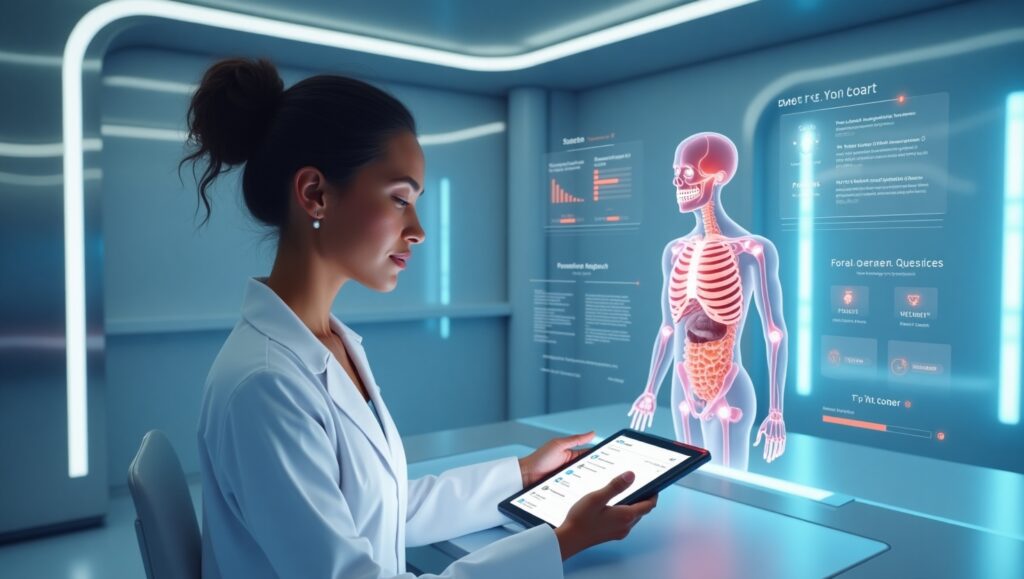Artificial Intelligence (AI) is revolutionizing the healthcare industry by improving diagnostic accuracy, reducing human errors, and enhancing patient care. In 2025, the demand for AI-powered diagnosis apps is expected to rise exponentially. If you are looking to develop a smart diagnosis app, this guide will walk you through the key features, development process, costs, and market opportunities.
Empowering Healthcare with AI: Smarter Diagnoses, Faster Treatments!

Why AI in Healthcare is the Future
1. Increasing Accuracy in Diagnoses
AI-driven diagnosis apps use machine learning (ML) models to analyze vast datasets, helping doctors detect diseases early and with greater accuracy.
2. Faster and More Efficient Healthcare Services
Smart apps reduce patient wait times by offering instant preliminary diagnoses, enabling healthcare providers to make quicker and better-informed decisions.
3. Cost-Effective Medical Solutions
With AI automation, medical professionals can focus on complex cases while routine checkups and diagnoses can be managed through AI-driven mobile applications.
Key Features of an AI-Powered Smart Diagnosis App
1. AI-Driven Symptom Checker
Users input symptoms, and AI algorithms analyze patient data to suggest possible diagnoses and recommend next steps.
2. Medical History Analysis
The app should integrate with Electronic Health Records (EHRs) to analyze past medical history and provide personalized insights.
3. Real-Time Consultation with AI Chatbots
AI-powered chatbots answer general medical queries and provide guidance based on machine learning data.
4. Predictive Analytics & Risk Assessment
By utilizing big data and AI, these apps can predict potential health risks for users based on their medical history and lifestyle.
5. Image Recognition for Medical Imaging
AI-based image processing can analyze X-rays, MRIs, and CT scans to detect abnormalities faster than traditional methods.
6. Integration with Wearable Devices
Smart diagnosis apps should be compatible with Apple Health, Google Fit, and other wearable devices to collect real-time health data.
7. HIPAA & GDPR Compliance
Ensuring strict data privacy and compliance with regulations such as HIPAA (USA) and GDPR (EU) is crucial for user trust.
Steps to Develop an AI-Powered Diagnosis App
Step 1: Market Research & Competitor Analysis
Analyze existing AI healthcare apps such as Ada Health, Buoy Health, and WebMD to understand user needs and market gaps.
Step 2: Define the App’s Core Functionalities
Determine the must-have features such as AI-powered diagnosis, chatbot integration, and EHR connectivity.
Step 3: Choose the Right Technology Stack
- Programming Languages: Python, JavaScript
- Frameworks: TensorFlow, PyTorch, React Native
- Cloud & Database: AWS, Firebase, MongoDB
- AI/ML Tools: IBM Watson, Google AI, OpenAI GPT
Step 4: Develop & Train AI Models
Train machine learning models using real medical datasets for precise diagnosis predictions.
Step 5: UI/UX Design for Better User Experience
Ensure an intuitive interface with a minimalist design for easy navigation by non-technical users.
Step 6: Testing & Regulatory Compliance
Perform rigorous quality testing and obtain necessary healthcare regulatory approvals.
Step 7: Deployment & Continuous Updates
Launch the app on iOS, Android, and web platforms, followed by continuous updates and AI model enhancements.
Cost to Develop a Smart Diagnosis App
The development cost depends on various factors such as app complexity, AI integration, and compliance requirements.
Basic MVP App: $10,000 – $30,000
Advanced AI-Powered App: $50,000 – $90,000
Enterprise-Grade Solution: $100,000+
Monetization Strategies for Smart Diagnosis Apps
1. Subscription Model
Charge users a monthly or yearly subscription fee for premium services like AI-based health assessments.
2. In-App Purchases
Offer additional features such as personalized health reports, advanced consultations, and priority support.
3. Partnerships with Healthcare Providers
Collaborate with hospitals, clinics, and insurance companies to integrate the app into their services.
4. Advertisements & Sponsored Content
Display relevant ads from pharmaceutical brands, health insurance companies, and fitness product vendors.
Future Trends in AI-Powered Healthcare Apps
1. AI-Powered Virtual Doctors
AI-based virtual assistants will become more sophisticated, providing automated yet accurate medical advice.
2. Blockchain for Secure Patient Data
Integrating blockchain technology will enhance data security and prevent medical fraud.
3. Voice & NLP-Based Diagnostics
Voice recognition AI will enable voice-based symptom checking and hands-free app navigation.
4. AI-Driven Personalized Medicine
AI will analyze genetic data to provide personalized treatment plans tailored to individual users.
Conclusion
AI-powered diagnosis apps are reshaping the future of healthcare. By 2025, these applications will be an essential part of the medical industry, providing faster, more accurate, and cost-effective solutions. If you’re planning to build an AI-powered healthcare app, investing in the right technology, security measures, and AI models will be crucial for success.



